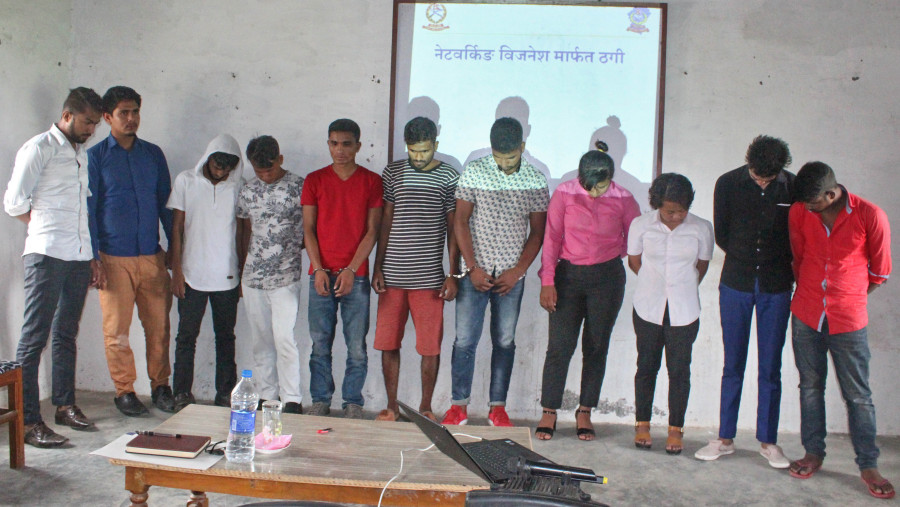National
Hundreds of Nepalis fall victims to pyramid scheme operating out of Uttar Pradesh
Police have arrested two primary operators of the business, but five others remain at large.
Manoj Paudel
Until three months ago, Saroj Thapa Magar was an employee of the Rastriya Banijya Bank in Dhading, earning Rs24,000 a month. That’s when he was approached by a man who promised to turn him into a millionaire within a year.
Magar was told he would initially be making Rs40,000 a month but would get the opportunity to make a lot more, depending on how many others he recruited. It was a ‘networking’ job, he was told, where employees would sell medicine and other household essentials. For every new employee that he recruited, he would get a portion of their sales. Those new employees would have a chance to make their own money by bringing in even more people.
Magar took out a loan and paid a man Rs365,000 for the opportunity. He also quit his job and moved to Pachperwa, a border town in Uttar Pradesh, India, where he worked for Aim Step Progressive, recruiting others into the business. He didn’t know what he had gotten himself into until the police raided the company.
“I was shocked when the chief of the company was arrested,” said Magar. “It was then that I realised I had been cheated.”
Magar is one of 350 Nepalis who fell for Aim Step’s pitch, a thinly disguised multi-level marketing operation, also commonly known as a pyramid scheme. The operation works by encouraging each member to expand their network and rope in more members. The taller and wider the pyramid scheme grows, the richer the returns, unsuspecting victims are told.
According to an initial estimate, the company defrauded around Rs70 million from its members, said police in the town of Krishnanagar, on the Nepal side of the border, where Magar now lives.
The Area Police Office in Krishnanagar said that Amit Chaudhary of Rautahat and Abhiraj Lama, who goes by Kanchha Lama Ghising, of Dhading were the primary operators of the scheme.
Multi-level marketing is illegal in Nepal, so Chaudhary and Lama had been operating their business out of India for the last 13 months.
According to the victims, they were asked to deposit Rs1,000 to fill a form and then another Rs1,500 to become a member. After becoming a member, the company would train them in Pachperwa for four days. Then, each of the members was asked to recruit five others into their network. Each of the new five members would have to introduce five more members into the business, expanding the network.
Members had to purchase medicines and household essentials to sell for a 25 percent kickback.
“I thought that we would earn more in the future. So we invested more and more,” said Rajesh Dagar, a native of Mugu, who was also caught up in the scheme.
Aim Step recruited people from various parts of the country, asking them to come to Butwal for a formal training. In Butwal, company representatives would then tell them that the office was moving to Pachperwa and would take them all along. In Pachperwa, the company had rented two buildings from where they ran an office and a training centre with hostel facilities.
Things started to unravel for Aim Step earlier this year, in February, when two women from Melung and Sunkoshi rural municipalities in Okhaldhunga were stopped by the Shanti Punarsthapana Griha, an anti-trafficking organisation that works along the Nepal-India border, while trying to cross into India. Makar Tamang, an Aim Step agent, was arrested by the police on suspicion of trafficking. Tamang was let go after he assured to provide Rs13,000 to each of them as travel expenditures.
Again, on April 10, two women from Rolpa were held with two other Aim Step agents at the border by the same organisation. Bhumiraj Bhattarai, the coordinator at the Griha, said that the police did not file a case at the time.
“At the time, police inspector Surya Bogati only tried to settle the case,” said Bhattarai.
On July 10, Griha once again questioned a group of women while they were trying to cross the border. The women said that they were on their way to Gorakhpur, but during interrogation, the police found out about the networking business.
Pratap Paudel, a police inspector, said they raided the office on July 17 and initially arrested five people.
“We had called some representatives of the network business to Nepal and then we made the arrests,” said Paudel.
Nepal’s Central Investigation Bureau arrested Chaudhary and Tamang from Tinkune in Kathmandu on July 22 on swindling charges. Five others remain at large.
Till date, 41 victims from Ilam, Jumla, Kalikot, Achham, Bardiya, Pyuthan, Mugu, Dailekh and Kailali districts have filed complaints with the police. According to Deep Shumsher Rana, superintendent of police in Kapilvastu, more than 200 people have come into contact, accusing the company of defrauding them.
Meanwhile, Magar’s life has come to a complete halt. He cannot return home without recovering his losses.
“I don’t have a job now and no means of earning money,” he said. “How can I go home?”




 8.12°C Kathmandu
8.12°C Kathmandu















